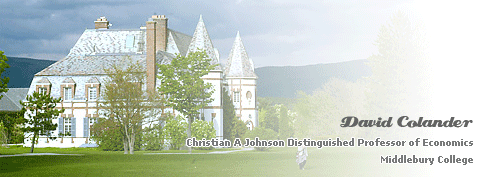History of Economic Thought Links
ttp://www.economicsamerica.org.html
http://economics.miningco.com
http://www.ny.frb.org/pihome/educator/
http://quote.yahoo.com/
ttp://socserv2.socsci.mcmaster.ca/~econ/ugcm/3ll3/
A large history of thought archive, contains both primary and secondary texts. A large number of authors including Smith, Babage, Mill, Marx, Mandeville, Mun, Schumpeter, and most others mentioned in Colander's History of Economic Thought with the notable exception of Friedrich von Hayek.
http://www.frbsf.org/econedu/unfrmd.great/greatschls.html
Schools of thought, great economists, and economics history in a nutshell, from the Federal Reserve Bank of San Francisco.
http://www.trmalthus.com/index.htm
A website devoted to Malthus and his ideas. Contains the full text of his Essay on the Principle of Population, as well as numerous links about him.
http://cfec.vub.ac.be/cfec/hope.htm
Contains Internet references to history of economics. A large number of links on various schools of economic thought and to numerous history of though journals and organizations.
http://csf.colorado.edu/psn/marx/
The Marx /Engels Internet archive. Contains a very large number of full text works in various formats, and a search engine to browse throught them; also features a lot of photos and biographical info, as well as some secondary research. In addition, works by/about DeLeon, Lenin, Stalin, Trotsky, Lunacharski, Luxemburg, Mao, Riazanov, Pannekoek, and Mariategui are included (as they are part of the Marxist literature).
http://www.hayekcenter.org/friedrichhayek/hayek.html
The Friedrich Hayek Scholars' Page: a plethora of links on Friedrich August von Hayek. Contains full text of essays, secondary research, biographical and photo materials, and even jokes and audio/video clips.
http://www.econ.jhu.edu/People/fonseca/walras/hardy.htm
The Leon Walras page contains numerous links on Walras, his works, and general equilibrium theory.
http://www.santafe.edu/index.html
The web site of the Santa Fe Institute. Features research and insights into the new science of complexity (complexity theory), plus a search engine for easy navigation.

